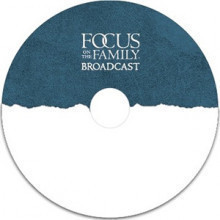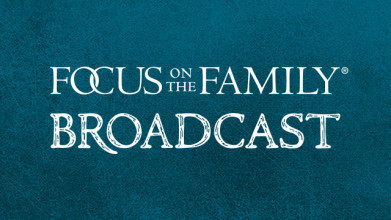Preview:
Philip Yancey: And so, somehow, we’re communicating the opposite of what Jesus said we c- should come across as flawed people, thirsty people who have found a source, who have found something that satisfies, and it changes us, and it’s good news, and we’d like you to have that, too.
End of Preview
John Fuller: That’s Philip Yancey, and he’s our guest today on Focus on the Family to share how you can be a witness for the gospel in a winsome way. I do hope you’ll stay with us for this important conversation. Thanks for joining us today. Your host is Focus president and author Jim Daly, and I’m John Fuller.
Jim Daly: John, I always enjoy talking to Philip. He’s a bestselling author, and most importantly, he spent years investigating how we can be salt and light as followers of Christ. And today, Philip will share fascinating examples of how we can balance truth and love when we engage nonbelievers.
John: Yeah, and Philip has written a number of books, uh, exploring questions of faith, and we’re about to hear a conversation, Jim, based on his book, Vanishing Grace: What Ever Happened to the Good News? And here’s how, Jim, you began that conversation.
Jim: The Book of John in the New Testament introduces Jesus as the word who became flesh, uh, full of grace and truth. That’s right out of John I, and it’s not easy, but as followers of Christ, we’re called to engage others in love and truth, and it is the eternal battle, I think, for all of us as Christians. And I know I’ve missed the mark before. I strive to do it well. Um, I’m pleased when I do that well, but again, it’s just very difficult depending upon those circumstances. And, Philip, it is great to have you with us. Thank you.
Philip: My pleasure, and I’m so glad you started with that quote from John, because, uh, I look at Jesus kind of holding out two hands, grace and truth, and I look at church history, and we’ve worked really hard on that truth part.
Jim: (laughs) We do.
Philip: La- last I heard, there were like 45,000 denominations in the world, and everyone thinks they’ve got a little, little more corner of the truth than the other 49,999. (laughs)
Jim: Yeah.
Philip: And I, I just wish we had denominations who would be striving to be more grace-filled than anybody else.
Jim: Well, let me, let’s start there.
Philip: Yeah.
Jim: I mean, that difference. We all talk about it. We all struggle with it. I knew a Christian leader who once told me, “You know, I understand God’s grace, but sometimes when it comes to those who don’t believe the way I believe, I’m afraid I’m going to become their friend and capitulate on the principles.”
Philip: Hmm.
Jim: I think that’s a well-stated concern or well-stated fear that some people, depending upon your personality type, you might pull back, because you think, man, if I like them, I might give in.
Philip: Hm. I haven’t thought of that before. That’s a, I suppose that’s a danger, and I think probably the way to a- avoid that is just to be plugged into a community of shared values, so that you get recharged whenever you’re around them, whether it’s a small group or a, a church service.
Philip: And w- we have this model in the early church. We keep going back there, because it worked so well. Actually, there weren’t many missionaries in the early church. There weren’t many evangelists. They kept to themselves, but they would come together. They would worship God. They would encourage each other, and then they would go out, and they were different than other people in the Roman empire, and ultimately, as people look at the way they lived, they said, “I, I kind of would rather be one of those people than me.” (laughs) “I want what they’ve got.”
Jim: (laughs)
Philip: And, and I think that’s how the church works best. If we, if we put out a sign of contradiction with the rest of the culture around us, our culture is very celebrity oriented. It’s very success-oriented, achievement-oriented, and Christians say, “Well, but we’re also supposed to care about other people, people who aren’t very successful and achievement-oriented. We’re here to serve.” I think about the, the, toward the end of John, when Jesus had his last night with the disciples, and it’s a beautiful passage, John 13 to 17, where it was his last shot, basically. He’s giving them the final instructions, and then he’s going to leave. He’s going to ascend, first die, and then resurrect, and then ascend, but this is his last time to give what’s most important. And I, I go back, and of course, he starts by washing their feet. You’re here to serve others, not to be served. And then, he says, “The mark of a follower of me is love,” and that’s what people ought to think. Oh, that person loves a lot. Must be a Christian, you know? (laughs)
Jim: Yeah, I-
Philip: Must be a Jesus follower, and then unity.
Jim: Yeah.
Philip: He said, “Boy, I wish, I wish you, and the church to follow, would have the same kind of unity that we enjoy in the trinity.”
Jim: Yeah, and we’ll, we’ll unpack that over the next few minutes, and I, you know, several things, the early church, the idea of love. L- let’s start with the recent Barna study that found nearly half of non-Christians have negative feelings toward evangelicals.
Philip: Mm-hmm.
Jim: I mean, that, that’s something right there. Although, I do understand that, um, you know, the, the word will become a stumbling block-
Philip: Right.
Jim: … is one reference. Um, you know, Jesus referenced bringing division because of the, you know, the distinction between the world and his followers, so that’s going to be there, but why is, you know, the concern around half of the non-believers feeling like Christians, uh, they have negative feelings toward Christians? Why, why do you think that exists?
Philip: Well, what struck me about that Barna survey is that just maybe 20 years before, 85% of non-Christians had a positive view of Christians. So, maybe they really didn’t believe in it, and they weren’t that interested in being religious themselves, but if a Christian was a neighbor, well, that’s a good thing, um, you know? They’ll be a good role model for your kids, and maybe they’ll cut the grass if you’re, if you got a broken ankle or something, you know? (laughs)
Jim: Yeah, that’s true.
Philip: It’s a good thing, and now more than half say, “I don’t want to live with, next door to one of those Christians,” and Barna tried to investigate that and find out what had happened in that 20-year period, and a lot of it had to do with divisive politics, where-
Jim: Hm.
Philip: … Christians became more identified, certainly in media, through a political lens. If you read the New York Times or Time Magazine, and tried to figure out, what is an evangelical? You would think, oh, it’s a radical, conservative Republican, you know? (laughs)
Jim: Right.
Philip: That’s what the, that’s what the media portrays, and in, in some ways, we are conservative. In some ways, we’re not. It depends on the issue.
Jim: Right.
Philip: You know, our, our issues are, are going to be a little different, always, from the r- surrounding culture, because we take them from the Bible, and the rest of culture doesn’t always.
Jim: You know, one of the difficult questions in that regard is, you know, one party does line up with a lot of the things that many Christians believe, like the right to life-
Philip: Mm-hmm.
Jim: … and, uh, the support of the police, and all kinds of things like that, and, you know, again, c- taking care of the poor tends to lean in a Democratic direction.
Philip: Mm-hmm.
Jim: So, if you can, I mean, hit, that one, because it’s so true. It’s, it’s complex, um-
Philip: Right. Well, I, I think of a story I heard from the director of the Evangelical Alliance in the UK, much like our National Association of Evangelicals.
Jim: Mm-hmm.
Philip: And, when John Major was the prime minister, this would have been maybe-
Jim: Right.
Philip: … 30 years ago or so-
Jim: Right.
Philip: … he called him in and said, um, “I hear about all these evangelicals, and I’m interested in them. You know, I, I want to appeal to their votes. (laughs) But, uh, I can’t figure them out. Can you tell me, are they poli- Are they conservative, or are they liberal?”
Jim: (laughs)
Philip: And, so, the head of the Evangelical Alliance said, “Well, let’s see. Let’s go down the list here. Um, they care about the poor, so some people would say that’s liberal, but they’re, they’re strongly pro-life and against in- infanticide and euthanasia. Some people would say that’s conservative. They’re against racism. Pe- some people would say that’s liberal. They support the rights of women. Some people would say that’s liberal, but they believe, uh, only in, in sex in, within a marriage. Many would say that’s conservative.” And he went down the list, and he said, (laughs) “You tell me.”
Jim: Right.
Philip: And Major said, “Well, I guess they’re neither one.” Well, they’re a little bit of both.
Jim: Right.
Philip: It depends on the issue.
Jim: And I think there is a fine art, if I could describe it that way, to embracing those things that are biblical-
Philip: Yeah.
Jim: … like, I would say, the, the pro-life effort, and then keeping your eyes and ears open to things with, like, helping the poor.
Philip: Yeah.
Jim: Um, you know, and again, people will say, “Well, that’s not government’s role to … It’s the church’s role,” but in soberness, you have to say that, you know, the government has more wherewithal-
Philip: Sure.
Jim: … to put money and resources toward that-
Philip: Sure.
Jim: … effort than the Christian church does, although the Christian church has a great history of taking care of the poor. Uh, y- you mentioned two types of, of Christians, uh, pre-Christian and post-Christian. What, what do you mean by those two descriptions?
Philip: Sometimes, I’ve done this so often. I’ll be sitting on an airplane or in a lobby somewhere, and, uh, I’ll start talking, and people will say, “What do you do?” “Well, I’m a writer.” “What do you write about?” And I explain some of my books, and “Oh, oh, one of those religious writers.” “Well, most of the time, I, yeah. These are matters of faith that I care about.” “Well, I used to be a Christian,” and then they’ll tell me some story about, uh, being wounded by the church the way it treated somebody, or, uh, maybe they didn’t like its stance on science, or, or, uh, a divorced person was mistreated, or a gay person was mistreated. And, you know, they just tell me some sad story. And they expect me to defend the church, and instead I, I kind of laugh and say, “Oh, is, it’s worse than that. Let me tell you, my story.” (laughs)
Jim: Yeah, right? (laughs)
Philip: Okay, and I, I’ve just read in this memoir, Where the Light Fell, that describes the toxic church I grew up in. It was in the south. It was on the wrong side of the civil rights movement, and, and a lot of things. A- and yet, I’ll say to them, uh, “Do, do you really think it’s a good trade to trade away the possibility of connecting with the lord of the universe because of the way some old lady treated your friend 30 years ago, you know?” (laughs)
Jim: That is a great question. That’s the same one asks. Like, are you really going to give up-
Philip: Yeah.
Jim: … your salvation?
Philip: And that’s kind of a post-Christian-
Jim: Yeah.
Philip: … because they’ve been, they’ve got a wound there, and then you meet other people who really have no exposure, and they’re kind of fascinated, you know? They, they know that people care about religion, and they see things on television, and they just, they’ve really never met somebody that’ll sit down and talk to them about what they believe.
Jim: Yeah.
Philip: And, you have a, usually, you need a different approach there, just to explain so much that’s good in our society comes directly out of the church, human rights, and, and care for the environment, and education, and medical care. You know, these all have Christian roots-
Jim: Yeah.
Philip: … very deeply.
Jim: Very true. I, I remember encountering a woman in the abortion industry, and, and, uh, we had a, a great discussion, and I remember when she first came into my office, she was shaking-
Philip: Hm.
Jim: … and I said, “Are you okay?” And, she said, “Well, my friends said you’re going to put a voodoo hex on me,” and I, I laughed, saying, “What, what do you know about Christianity?” And she said, “Really, nothing. I just think you want to try to kill us.”
Philip: Hm.
Jim: I said, “Nothing could be further from the truth, you know? The, do you mind if I could share with you what it is we believe?” And she said, and this really haunted me, she said, “I would appreciate that, because no one’s ever taken the time to tell me.”
Philip: Wow.
Jim: Isn’t that ama-
Philip: It is.
Jim: We make the assumption that if you’re on the other side of something we believe-
Philip: Right.
Jim: … then you, you’ve calculated and made the decision that you are against God in that thing, whether it’s life-
Philip: Right.
Jim: … or something like that, and sometimes they’ve never even heard-
Philip: Yeah.
Jim: … the alternative.
Philip: Well, and I’m sure you know that story, Jim, about, uh, the original Jane Roe.
Jim: Yeah.
Philip: (laughs) Roe versus Wade.
Jim: Yeah.
Philip: Where at first, the head of Operation Rescue would, would follow her around and yell, “baby killer,” and things like that, and then they got a new head, and he ended up being in the same complex where she worked with Planned Parenthood.
Jim: Huh.
Philip: And, she would go out for a cigarette break, and he started sitting with her during her break, and changed her completely, and she eventually renounced her former position and became a Christian.
Jim: You mention in the book this idea that, uh, nonbelievers are lost or people who are thirsty, potentially, that God’s love is for every person. I, I totally ascribe to that, because I think it’s so true and so accurate. I don’t think God’s against anybody. He wants everyone to know him. Uh, how do you, (laughs) how do you remember that when you’re in the heat of a spiritual battle with your neighbor or something like that?
Philip: (laughs)
Jim: Chuck Colson told me once, and I don’t think he coined it, but he used it often, and that is, “You don’t get mad at a blind man who steps on your foot.”
Philip: Huh.
Jim: And he parlayed that into, spiritually, don’t get mad at people that don’t understand the way of God.
Philip: That’s very good.
Jim: And I, I think it’s true. It’s been a guiding principle for me.
Philip: Right. I got the phrase thirsty from Henri Nouwen, I’m sure you know that name.
Jim: Right.
Philip: Henry, uh, was a priest, uh, spoke a lot of times to the evangelical audiences, spent the last part of his life not at Harvard and Yale where he had earlier taught, but working with the severely mentally challenged people in L’Arche in Toronto. Back when the AIDS epidemic first started, so this would have been when Ronald Reagan was president, really, he heard about this disease, and he heard that there were a lot of gay men. It was actually called the Gay Men’s Syndrome, right?
Jim: Mm-hmm.
Philip: The CDC back then, because almost everybody that was reporting this strange disease were part of the homosexual male community.
Jim: Right.
Philip: So, he heard there was a, there was a clinic going on in San Francisco, and he flew out there, and he said it was, it was just so sad, an open ward, and all these guys were going to die soon, because there was no treatment at all in, in those days. And, he said, “I just went up and down the rows of men,” and he said, and he said, “I’m a priest, so I like to listen to people’s stories. That’s what we do. Can you tell me your story?” And, he said some of them would almost spit at him and say, “I don’t want any of this stuff, this religious stuff,” but others would tell their stories, and he said, “Again and again, I heard people who were thirsting for love, and I would say, ‘Did you find it? You know? (laughs) Did it, did it satisfy you?’” And he went on and, and talked about the, uh, the woman at the well, you know? Jesus, I see that you’re thirsting. Has the water satisfied you? No, it hasn’t.
Jim: Mm-hmm.
Philip: Would you like to know a living water that does satisfy you? And he said, “When I returned from that, my prayers changed. When I was around people that offended me in some way, I used to pray, ‘Lord, help them to see the light,’ or ‘Help me to be kind to these morally offensive persons.’” He said, “Now, I pray for thirsty people. I said, ‘God, help me to see those that even offend me as thirsty people.’ If I can see them as thirsty people, and realize my job is to point them to the living water that indeed satisfies,” that really turned a corner in how he prayed and how he saw people that he disagreed with, profoundly.
Jim: Yeah. You know, um, that reminds me of a theologian that I know who’s still living, who said to me on the phone one time, quite appropriately, I think, we were talking about some difficulties in the culture, and he was referring to some Christians that were edgy, very, uh, upset about some things, probably in the political arena, and he said, “Man, you don’t have to go out of your way to be hated.”
Philip: Hm.
Jim: And I, that’s another great statement that, you know, the offense of the gospel should be the offense, not you and your personality.
Philip: Yeah, yeah.
Jim: And I, that’s another guiding principle, you know?
Philip: Yeah.
Jim: That if you’re the one preventing someone to coming to know the Lord, you’re in some deep weeds there, spiritually, in my opinion-
Philip: Yeah.
Jim: … if it’s your personality, your aggression, your behavior towards someone who doesn’t know the Lord. If that’s what’s preventing it, don’t wear that as a badge, because I don’t think the Lord will be happy with that, in the end. Speak the truth but do so in love. Relate to that. I mean, the clanging symbol and all the great scriptures we have-
Philip: Yeah.
Jim: … that if you don’t have love, you really don’t have anything.
Philip: That’s right. That’s right.
Jim: We tend to ignore those.
Philip: We do, and that reminds me of, uh, a great phrase from Martin Luther King Jr., who, of course, was a very religious man. He was a clergyman, and he, he said, we have to fight for some issues that, that are worth fighting, but we use different weapons. We use the weapons of grace.
Jim: Uh, Phil, you have a story about a Christian filmmaker who attended Sundance Film Festival. What happened in that context?
Philip: Right.
Jim: Because I think these illustrations are really helpful for us.
Philip: Right. Yeah. He takes a group of, uh, seminary students from Fuller Seminary, where he teaches classes in filmmaking, to Sundance, and Sundance is primarily, you know, the Hollywood, edgy-
Jim: Yeah.
Philip: … independent films-
Jim: Right.
Philip: … you know, things that you wouldn’t even get across in-
Jim: Started by Robert Redford, I think.
Philip: That’s right, yeah.
Jim: Yeah.
Philip: And, so, he had a group of about 20 Christians, and they attended this one that was, the film was making fun of the church, and how ridiculous it was, and how strict, and, and, uh, just a lot of negatives about the church, and people were hooting and hollering, yeah, yeah, you know, those are people who had been wounded, probably-
Jim: Right.
Philip: … at one point. And so, they had an audience interaction time, and a couple people asked questions, and then he stood up and said, “My name is so-and-so, and I’m from, uh, I’m an evangelical Christian, and I come from Fuller Seminary.” Things went really quiet. (laughs)
Jim: (laughs)
Philip: And he said, “I just want to apologize for the ways that the church has, has wounded some of you. Um, I don’t agree with everything you said in the film, but some of it, it’s true, and I know it’s true, and, and we’re wrong, and I’m sorry,” and sat down. He said it was just silent. And then, afterwards, all these people came up to him and said, “I’ve never heard a Christian apologize.”
Jim: Yeah.
Philip: “Thank you so much for that. Let me tell you my story,” and they would tell their story. And he’s been going ever since. He takes that, that same group, every year, so he’s gotten to know some of the filmmakers, and it’s changed the whole spirit of the kind of the anti-Christian spirit of the, of the festival. They have a, the Christians have a place. They have a voice there now.
Jim: Right.
Philip: And it’s a, an attractive voice, not a-
Jim: Yeah.
Philip: … offensive voice.
Jim: You know, Philip, I had an experience similar to that, and I’ve never shared this publicly, and again, the names aren’t important, but I remember reaching out to someone in the LGBTQ community to ask him if he wanted to have coffee, just to meet, and I know that that group and that particular organization saw us as enemies.
Philip: Mm-hmm.
Jim: And that was part of it. I wanted to let him know I’m a human being just like he is, basically. So, we met at a coffee place, and it was profound. Um, he brought a bunch of research that he had looked at our website and had some corrections for us in the way that we use terminology in that space, the LGBTQ space, and, uh, you know, so I thanked him for that. Thanks for doing that homework. I’ll take a look at it and have the team, you know, make sure that we’re in agreement on those things. But I remember saying to him, and I’m sitting here, having this wrestling match with the Lord, going, “Lord, why did you want me to meet with him?” Because I did feel that impression from the Lord to do this, to reach out, and what wafted through my mind and through my heart was, “Tell him I love him.”
Philip: Hm.
Jim: You know, you can imagine the conversation that immediately starts happening. “Oh, Lord, are you sure?”
Philip: (laughs)
Jim: I’m sitting in a public coffee place, but I did it. I just said to him, “Hey, I think the only reason that I wanted to meet today is to let you know something, and that is, God loves you.” Boom. He started crying-
Philip: Wow.
Jim: … right at the table. And, I said, “Could you tell me why it’s touched a nerve?” And, he just said, “I just never expected anyone from Focus on the Family to tell a gay man that God loved him.”
Philip: Hm.
Jim: And then, you know, that, woof. I mean, that is the profound truth, and it’s not, you know, no sin keeps us from God.
Philip: Yeah.
Jim: God knows us. He loves us. He created us. And, I just felt, like, wow. Um, you know, we don’t, we shouldn’t supersize sins, right?
Philip: Sure.
Jim: Sin is sin, according to scripture, and, uh, if I look at a woman, have lust in my heart, the Lord said I al- already committed adultery, right?
Philip: Hm.
Jim: So, let’s get rid of that one. (laughs) You know?
Philip: Yeah, yeah.
Jim: When you start wanting to edit the book.
Philip: Well, every, every religion says that God loves good people. It’s nothing new, but Jesus came with a different message. God loves bad people. (laughs)
Jim: Yeah, and I’m not one of them.
Philip: And that’s radical.
Jim: (laughs)
Philip: Yeah, right. (laughs) and you look at his parables, you look at the people he hung around, uh, who’s the hero of the parable of the prodigal son? Is it the older brother who did everything right? No, he looks pretty bad in Jesus’ story. It’s the prodigal who did everything wrong, and yet, God loved him anyway.
Jim: Yeah.
Philip: God loves enemies. God loves bad people. And the scene in the temple where there’s the Pharisee saying, “Well, I’m glad I’m not that guy over there. He’s a sinner,” and the sinner only has one prayer, “God, help me. I’m a sinner.” And, Jesus says, “Which prayer is God listening to?” And it’s pretty clear what the answer is. (laughs) The one who admits a need. And, grace is, is absolutely free. You can’t do anything to earn it, to deserve it. There’s no 10 steps I can give to you to make God love you. It doesn’t work that way.
Jim: Yeah.
Philip: God already loves you, and grace is free, but it’s a gift, and to receive a gift, you have to have open hands. If your hands are closed tight in a fist, which some religious people do, “I’m better than 99% of the people in this country,” then you miss the gift of grace.
Jim: Yeah.
Philip: It falls to the ground.
Jim: Right, and y- when you’re reading, especially the gospels, Jesus’ interaction with people, what’s really profound, if you try to take in the aroma of what he’s encountering, he seems to like to hang out with sinners.
Philip: Yeah, he does.
Jim: Matthew the tax collector, the woman at the well that we talked about, the woman caught in adultery.
Philip: Hm.
Jim: I mean, it, it seems like those are people that knew what truth is better than the religious leaders at the time. They knew what they were-
Philip: Right.
Jim: … that they didn’t measure up.
Philip: Right.
Jim: And, when he pointed it out, boom, their hearts went toward him, as opposed to the religious people who thought they had it all together, and ended, ended up hating him to the point of rallying to crucify him.
Philip: Mm-hmm. I remember when I was writing the book, The Jesus I Never Knew, I was puzzled by why Jesus was so upset at the Pharisees, because as I was doing research, it seemed like they were closest to what he believed and how he behaved as anybody on, on earth, you know? They, they worked to follow every one of the laws in the Old Testament. They were Bible believing. They were teaching, you know. And yet, in, in chapters like, uh, Matthew 23, Luke 11, Jesus is really pretty tough on the Pharisee.
Jim: Oh, yeah.
Philip: They’re a bunch of white-washed tombs, you know? And the more I read about it, the more I decided the problem with Pharisees is that they hung around other Pharisees all day, (laughs) and they started competing, and Jesus was scornful. Here, you’re, you tithe your kitchen spices, your salt and pepper, your cumin, your oregano, whatever. You make sure the church gets 10%, but there are these huge issues of injustice going on around you, and you don’t care about those things.
Jim: Yeah.
Philip: And, if you’re around people who are just like you, it really distorts your vision, and that’s why it’s so important, as Jesus told us, to go out and serve people who are unlike us. If you hang out in a homeless shelter, if you hang out in a prison, you’re going to be tested.
Jim: Yeah.
Philip: Your faith is going to be tested, and you’re going to, you’re going to understand, it’s easy to categorize these people, to dismiss them, to think of them as kind of a sociological group. When you get to know them as human beings, then you can feel the compassion that eventually attracted people to Jesus in his day and should attract people to us.
Jim: Absolutely. You know, you, just reading the New Testament several times, obviously, and you start looking for the core themes, and there are so many, so many wonderful things in the New Testament. Um, Old Testament, too, but, you know, Jesus arrives, and we kind of tilt into that New Testament teaching that he gives us, but two things seem like, you know, billboards for me. One is salvation through Christ, and Christ alone, and don’t become a Pharisee.
Philip: (laughs)
Jim: Those are kind of the two billboards of the New Testament.
Philip: Yeah.
Jim: And it sends a message, you know? That don’t think more highly of yourself than you should.
Philip: That kind of reminds me of a, of a little anecdote that I put in this book, Vanishing Grace, and somebody had surveyed the three phrases’ people most want to hear. Uh, the first one is I love you. The second one is I, I’m sorry. And the third one is supper’s ready. (laughs)
Jim: (laughs)
Philip: And, this preacher said, “Actually, that’s a good summary of the gospel, you know?” (laughs)
Jim: In what way?
Philip: Well, that God loves us, that he accepts our apology, our repentance, and there’s a feast awaiting for us. (laughs)
Jim: Boy, that is good. What a good place to land. Uh, Phil, this has been such a good conversation. We got more to cover, so let’s come back next time and keep the conversation going. Can we, do it?
Philip: Let’s do it.
John: And that concludes part one of a great conversation, Jim, that you had with Philip Yancey, and I really appreciate how he highlighted the gospel, and as Philip said, uh, so simply, “God loves you. He forgives you. He invites you to enjoy fellowship with him.” And, for our listeners, be sure to join us tomorrow for part two of the discussion. Now, in the meantime, you can find more resources on our website to help you in your spiritual walk. We have a free booklet that you can download. It’s called Coming Home. Uh, it’s a terrific little resource to share with friends or loved ones. It describes very simply what it means to trust in Christ. You’ll find it at focusonthefamily.com/broadcast.
Jim: And, if you’re a believer in Christ, consider helping us share the good news with others. A monthly pledge to Focus on the Family is a great way to do that. We rely on partners who can provide ongoing support to stabilize our budget and plan for ministry in the months ahead. And, of course, a one-time gift would be helpful, as well. When you make a pledge or a donation today, we’d love to send you a copy of Vanishing Grace as our way of saying thank you.
John: Donate as you can to the ministry and request your copy of Vanishing Grace: What Ever Happened to the Good News? You can do that when you call 800, the letter A, and the word FAMILY, 800-232-6459, or once again, you can find us at focusonthefamily.com/broadcast. On behalf of Jim Daly and the entire team, thanks for joining us today for Focus on the Family. I’m John Fuller, inviting you back as we once again help you and your family thrive in Christ.



















